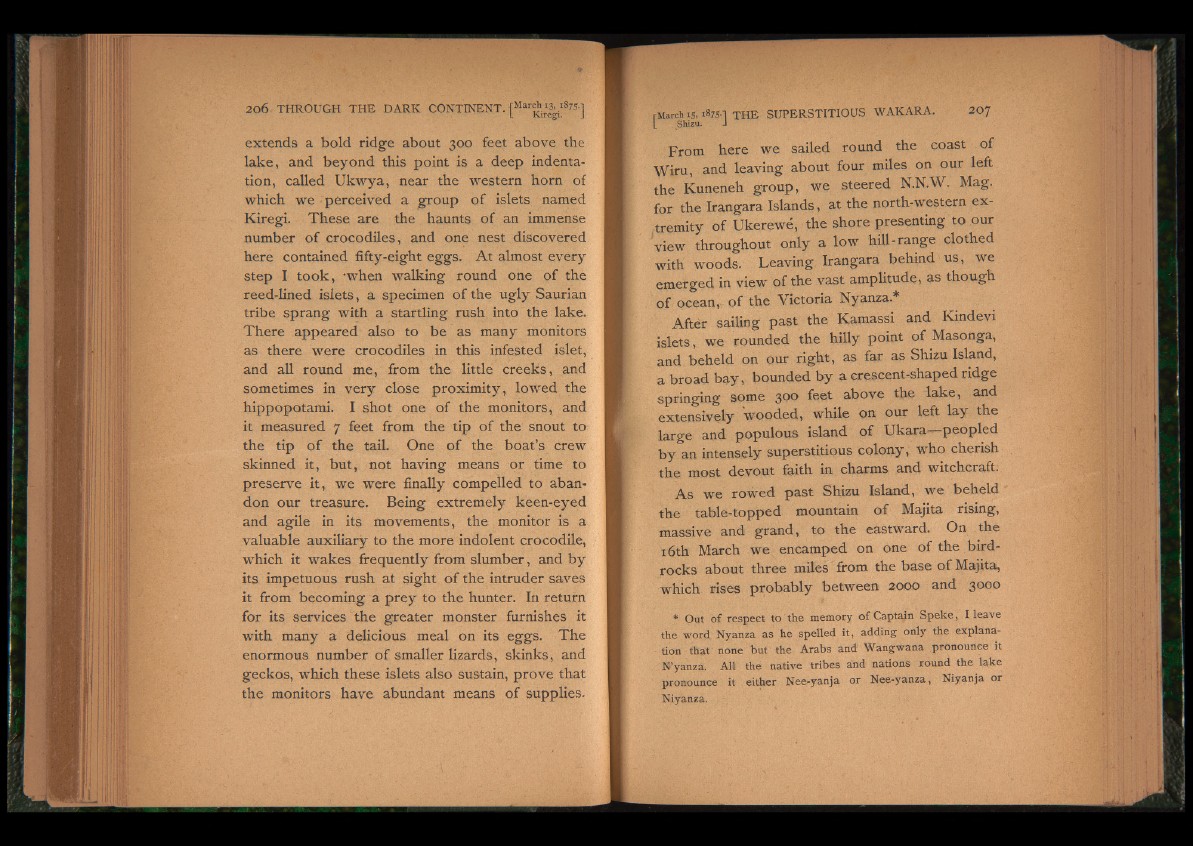
206 t h r o u g h t h e d a r k c o n t in e n t . [“ ^Kir^;1875']
extends a bold ridge about 300 feet above the
la k e , and beyond this point is a deep indentation,
called U kw y a , near the western horn of
which we perceived a group o f islets named
Kiregi. These are the haunts o f an immense
number o f crocodiles, and one nest discovered
here contained fifty-eight eggs. A t almost every
step I to o k , ‘when walking round one o f the
reed-lined isle ts , a specimen o f the u g ly Saurian
tribe sprang with a startling rush into the lake.
There appeared also to be as many monitors
as there were crocodiles in this infested islet,
and all round me, from the little c re ek s , and
sometimes in v e ry close proximity, lowed the
hippopotami. I shot one o f the monitors, and
it measured 7 feet from the tip o f the snout to
the tip o f the tail. One o f the boat’s crew
skinned it, but, not having means or time to
preserve it, we were finally compelled to abandon
our treasure. Being extremely keen-eyed
and agile in its movements, the monitor is a
valuable auxiliary to the more indolent crocodile,
which it wakes frequently from slumber, and b y
its impetuous rush at sight o f the intruder saves
it from becoming a p re y to the hunter. In return
for its services the greater monster furnishes it
with many a delicious meal on its eggs. T he
enormous number o f smaller lizards, skinks, and
geckos, which these islets also sustain, prove that
the monitors have abundant means o f supplies.
rMarch 15,1875.1 x h e SUPERSTITIOUS WAKARA. 207
[ Shizu. J
From here we sailed round the coast of
Wiru, and leaving about four miles on our left
the Kuneneh group, we steered N.N.W. Mag.
for the Irangara Islands, at the north-western e x tremity
o f Ukerewe, the shore presenting to our
view throughout only a low hill-range clothed
with woods. L e a v i n g Irangara behind us, we
emerged in view of the vast amplitude» as though
o f ocean, o f the \ ic to r ia Nyanza.
After sailing past the Kamassi and Kindevi
islets, we rounded the hilly point o f Masonga,
and beheld on our right, as far as Shizu Island,
a broad b a y , bounded b y a crescent-shaped ridge
springing some 300 feet above the lake , and
extensively wooded, while on our left la y the
large and populous island o f Ukara— peopled
b y an intensely superstitious cp lo n y , who cherish
the most devout faith in charms and witchcraft:
A s we rowed past Shizu Island, we beheld
the table-topped mountain o f Majita rising,
massive and grand, to the eastward. On the
16th March we encamped on one o f the bird-
rocks about three miles from the base o f Majita,
which rises probably between 2000 and 3000
* Out of respect to the memory o f Captain Speke, I leave
the word Nyanza as he spelled it, adding only the explanation
that none but the Arabs and Wangwana pronounce it
N’yanza. All the native tribes and nations round the lake
pronounce it either Nee-yanja or Nee-yanza, Niyanja or
Niyanza.